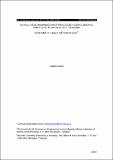| dc.contributor.author | Sudda, Martha | |
| dc.contributor.author | Kusiluka, Lughano | |
| dc.contributor.author | Kassim, Neema | |
| dc.date.accessioned | 2023-10-03T09:37:58Z | |
| dc.date.available | 2023-10-03T09:37:58Z | |
| dc.date.issued | 2017-11-05 | |
| dc.identifier.uri | https://doi.org/10.18697/ajfand.80.16775 | |
| dc.identifier.uri | https://dspace.nm-aist.ac.tz/handle/20.500.12479/2094 | |
| dc.description | This research article was published in the African Journal of Food, Agriculture, Nutrition and Development Volume 17, No. 4, November 2017 | en_US |
| dc.description.abstract | This study aimed at investigating the animal health management practices in zero grazing
dairy units. A questionnaire was used to assess the veterinary practices including the
administration of antibiotics and other veterinary inputs to promote growth, prevent and
treat diseases. Sixty-five (65) respondents were involved in the study. All the respondents
(100%) reported that they did not use growth promoters while 98.5% reported the use of
prophylactic vaccines. No withdrawal periods were observed for all the prophylactic
vaccines given to animals as instructed by Ward Livestock Officers that the vaccines
were not harmful to the health of consumers. Of the 65 respondents, 95.4% (62) reported
the use of therapeutic antibiotics. The withdrawal period for therapeutic antibiotics
ranged from 1 to 3 days as reported by 60% of the respondents while 24.6% (16) reported
the withdrawal period of between 4 to 7 days, 4.6% did not observe withdrawal periods
and 6.2% depended on the instructions from the veterinarians. Of the respondents, 53.8%
attended animal health management training and 59.6% kept no records for any health
interventions made to their animals. Based on the observational findings, majority
(84.6%) of the cow’s enclosures were of poor hygiene. Warm water was used by 87.7%
of the respondents to wash the udders prior to milking, 93.8% used towels to drain water
from the udder(s) and100% of farmers lubricated the teats with udder salve prior to
milking. Poor hygiene of the enclosures and washing the udders instead of teats only may
predispose animals to infectious disease and this may lead to increased use of antibiotics,
which may result into emergence of antibiotic resistance. It is, therefore, recommended
that farmers should be trained on best animal health management practices such as teat
washing, removal of manure from the animal pens as preventive measures for infectious
diseases as well as improving the health and productivity of their animals. | en_US |
| dc.language.iso | en | en_US |
| dc.publisher | African Journals Online (AJOL) | en_US |
| dc.subject | Animal health | en_US |
| dc.subject | Management practices | en_US |
| dc.subject | Zero grazing | en_US |
| dc.subject | Zoonotic infections | en_US |
| dc.subject | Antibiotic resistance | en_US |
| dc.title | Animal health management practices in zero grazing dairy units in Arusha City, Tanzania | en_US |
| dc.type | Article | en_US |

